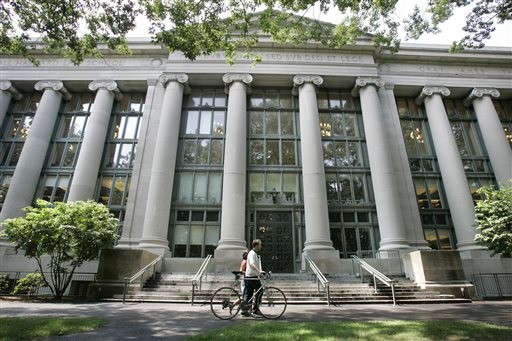At Harvard's newest center, researchers look for happiness
Change Size
 A bicyclist walks by Harvard University's Langdell Hall, which includes Harvard Law School's library, in Cambridge, Mass., Aug. 1, 2005. (AP/Charles Krupa)
A bicyclist walks by Harvard University's Langdell Hall, which includes Harvard Law School's library, in Cambridge, Mass., Aug. 1, 2005. (AP/Charles Krupa)
For those mired in the eternal quest for health and happiness, there's some good news. Harvard is on the case.
With the help of a US$21 million donation, the Ivy League school is rounding up top researchers and launching a center to study happiness and health, and whether they're connected.
"We're going to be trying to see if the old adage that happiness makes you healthier is true," said Laura Kubzansky, co-director of the new center and a professor social and behavioral sciences.
Officially, it's called the Lee Kum Sheung Center for Health and Happiness, housed at Harvard's school of public health. It was created with a donation from the family of Lee Kum Sheung, the man who invented oyster sauce in China in 1888. Since then, his enterprise has grown into two Hong Kong-based international companies that sell food and health products.
The center is taking on questions about happiness that have split scientists. Some believe there's a clear link between mental and physical health, and several studies have supported the idea. Optimism, for example, has been tied to better heart health. But some other studies have recently found that happiness has no direct effect on mortality.
Harvard plans to add more evidence to the debate, but by studying the question, researchers also hope to learn more about what makes people happy. They want to know if certain behaviors are tied to mental and physical health, and how factors like income and race play a role. They're complex questions, Kubzansky said, with few easy answers.
"We're not going be in the business of saying to people, 'Don't worry, be happy,'" she said. "There are many social forces and constraints that make it impossible or harder for people to attain these states of mental well-being."
Ultimately, the goal is to produce findings that can be used to help people stay healthy and happy.
The work is a departure from the type of medicine that aims to treat or cure diseases. Here, researchers are studying the absence of disease.
"If you only ever look at the bad things that happen, then you may not understand the full spectrum of factors that matter," Kubzansky said. "We're trying to look at a bigger spectrum of health."
And then there's the question about how to measure happiness. Until now, most researchers have relied on data from subjects who report their feelings. But the Harvard center will explore other ideas, including technology that can help gauge moods. The work will draw on faculty from many fields, including psychology, medicine and sociology.
For now, the center is housed in a building at Harvard's school of public health. Other than its name and its yellow walls, though, a center for happiness mostly looks like any other.
"We don't have emojis on the wall," Kubzansky said. "I thought about it, but we're trying to maintain gravitas."









